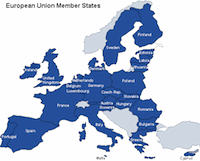Posted on 08 April 2013. Tags: European Union, trade deficit, transatlantic trade agreement
We have the worst trade performance of any country in the world. And they tell us we need a trade agreement with Europe? The U.S. Chamber of Commerce is pushing it. Here is more insight on why the Europeans want it.

European leaders are expected to press Mr. Lew on an eagerly anticipated free-trade agreement. A study by the European Commission found that a deal could increase European Union exports to the United States by as much as 28 percent, a lift for the flailing European economy.
If we are going to recover economically, job-wise and fiscally, we need to pursue balance trade. That means eliminating the trade deficit. We need to produce more of what we consume. The bipartisan insanity on the U.S. side continues, as Obama and members of both parties in Congress have spoken in favor of an EU trade deal.
CPA members focused, in our March Legislative Fly In, upon convincing Congress that the trade deficit is THE core economic problem. We need to strengthen our persuasion and our organization as Trade Promotion Authority is being crafted in Congress this year.
Posted in Trade
Posted on 29 September 2007. Tags: China, currency manipulation, European Union, G-7, Japan, trade deficit, weak dollar
Europe is more worried about the U.S./China trade imbalance than is our own government.
The
dollar is falling. Old, but continuing news. You can’t keep a
strong dollar with record trade deficits. This is not
complex. It is simple.
The European members of the Group of Seven (G-7) leading
industrial nations are debating whether to publicly acknowledge
concerns about the weak dollar. A Wall Street Journal article,
"G-7 Debates Whether to Discuss Dollar," has this, but I can’t link to
the subscription-only piece. Notable quotes from the piece follow after "read more."
"It is true that all Europeans are worried about the strong euro,
but it is unlikely that we will see any mention of it in the G7
statement," one of the people close to the situation said.
By contrast, there appears to be early consensus that the Chinese yuan will receive a mention in the G-7 communique, they said.
European Union Monetary Affairs Commissioner Joaquin Almunia said:
"We are preoccupied with the value of the dollar… One can’t
expect us to remain passive when it comes to paying for the imbalances"
of trade between the U.S. and China.
But our government is holding the driving wheel steady, as we approach the cliff:
U.S. Treasury Secretary "Henry Paulson is a strong
supporter of market fundamentals and believes currency levels should be
set by markets," one of the people said. "Therefore the U.S. is likely
to resist any calls to put the fall in the dollar in the G-7 final
communique, unless the fall becomes so disorderly that it triggers
inflation risks for the U.S. economy."
I like market fundamentals, too, Henry. Let us, then, get rid of
Chinese and Japanese currency manipulation. Deal or no deal?
Posted in Currency, Trade





Recent Comments